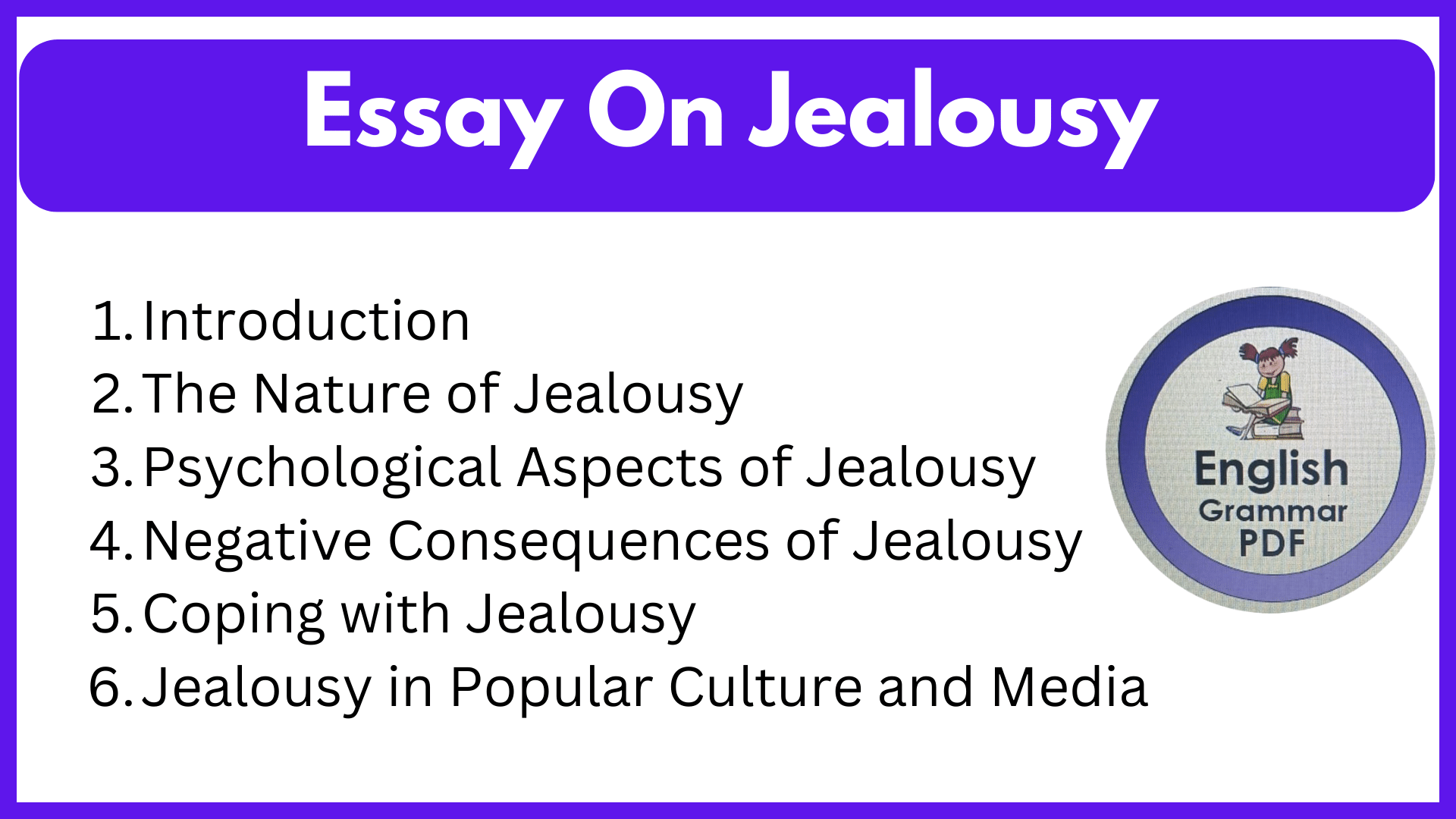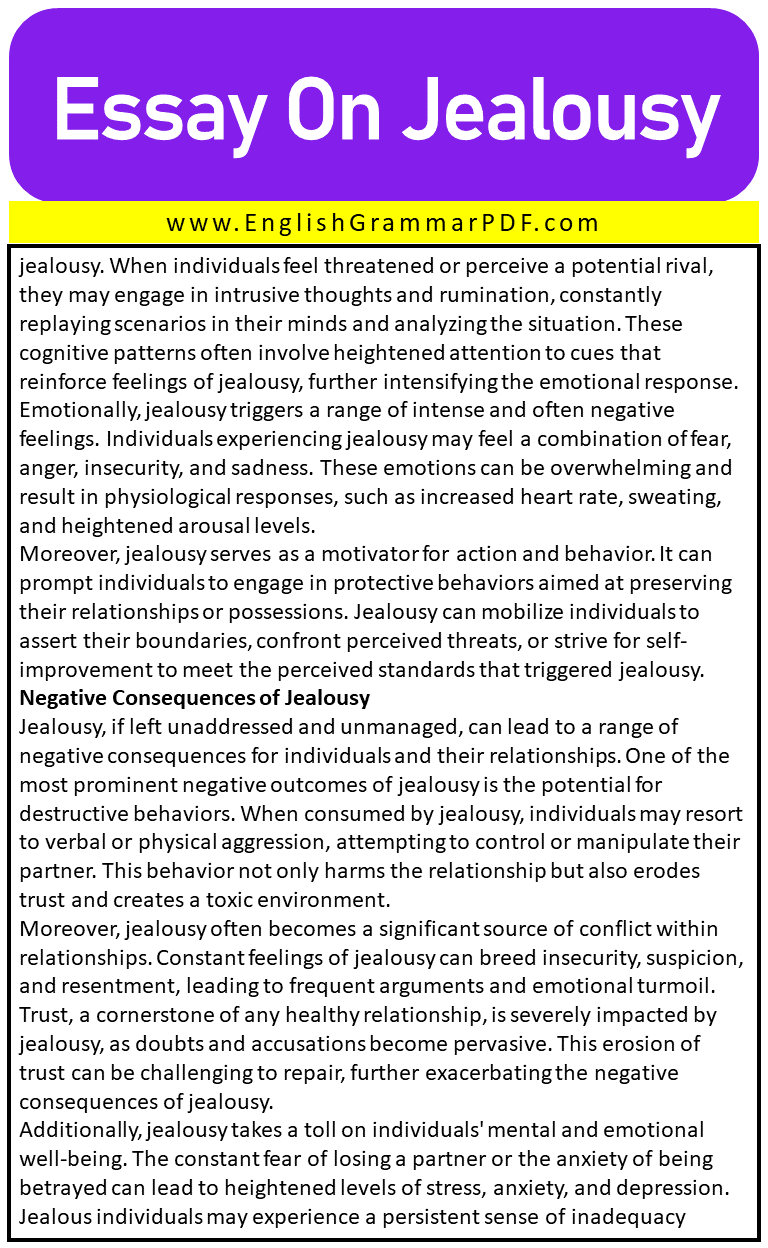Essay On Jealousy
Outline of Essay:
- Introduction
- The Nature of Jealousy
- Psychological Aspects of Jealousy
- Negative Consequences of Jealousy
- Coping with Jealousy
- Jealousy in Popular Culture and Media
Introduction
Jealousy is a powerful and multifaceted emotion that has intrigued philosophers, psychologists, and individuals throughout history. It is a complex blend of fear, insecurity, and possessiveness that arises when we perceive a threat to something we value, such as a relationship or a possession. Understanding jealousy is essential because it influences our thoughts, actions, and relationships. This essay delves into the various aspects of jealousy, its nature, psychological underpinnings, positive and negative effects, coping mechanisms, and its presence in different contexts, as well as its portrayal in popular culture. Ultimately, this exploration aims to highlight the significance of comprehending and effectively managing jealousy.
The Nature of Jealousy
To begin understanding jealousy, it is essential to define its parameters and distinguish it from related emotions. Jealousy involves a combination of fear of losing something valuable and resentment toward a perceived rival. Unlike envy, which involves longing for what others possess, jealousy centers around protecting what is already possessed. Furthermore, jealousy can differ across cultures, as social norms, values, and relationship dynamics influence its manifestation.
Jealousy also has roots in human evolution. From an evolutionary perspective, jealousy can be seen as a mechanism to protect our mating interests. Males may experience sexual jealousy to ensure paternity certainty, while females may experience emotional jealousy to secure the emotional investment and resources of their partners.
Psychological Aspects of Jealousy
Cognitive processes play a significant role in the experience of jealousy. When individuals feel threatened or perceive a potential rival, they may engage in intrusive thoughts and rumination, constantly replaying scenarios in their minds and analyzing the situation. These cognitive patterns often involve heightened attention to cues that reinforce feelings of jealousy, further intensifying the emotional response.
Emotionally, jealousy triggers a range of intense and often negative feelings. Individuals experiencing jealousy may feel a combination of fear, anger, insecurity, and sadness. These emotions can be overwhelming and result in physiological responses, such as increased heart rate, sweating, and heightened arousal levels.
Moreover, jealousy serves as a motivator for action and behavior. It can prompt individuals to engage in protective behaviors aimed at preserving their relationships or possessions. Jealousy can mobilize individuals to assert their boundaries, confront perceived threats, or strive for self-improvement to meet the perceived standards that triggered jealousy.
Negative Consequences of Jealousy
Jealousy, if left unaddressed and unmanaged, can lead to a range of negative consequences for individuals and their relationships. One of the most prominent negative outcomes of jealousy is the potential for destructive behaviors. When consumed by jealousy, individuals may resort to verbal or physical aggression, attempting to control or manipulate their partner. This behavior not only harms the relationship but also erodes trust and creates a toxic environment.
Moreover, jealousy often becomes a significant source of conflict within relationships. Constant feelings of jealousy can breed insecurity, suspicion, and resentment, leading to frequent arguments and emotional turmoil. Trust, a cornerstone of any healthy relationship, is severely impacted by jealousy, as doubts and accusations become pervasive. This erosion of trust can be challenging to repair, further exacerbating the negative consequences of jealousy.
Additionally, jealousy takes a toll on individuals’ mental and emotional well-being. The constant fear of losing a partner or the anxiety of being betrayed can lead to heightened levels of stress, anxiety, and depression. Jealous individuals may experience a persistent sense of inadequacy, low self-esteem, and self-doubt. This emotional burden can affect other areas of life, including work performance and social interactions, creating a negative spiral of unhappiness and dissatisfaction.
While jealousy is often associated with negative outcomes, it can also have positive dimensions. In certain cases, jealousy can serve as a sign of love and commitment. It can signify that individuals value their relationships and are invested in protecting them. Furthermore, jealousy plays a role in maintaining relationship boundaries. It establishes expectations of fidelity and exclusivity, thus safeguarding the integrity of the partnership
Coping with Jealousy
Coping with jealousy is essential for maintaining healthy relationships and promoting personal well-being. Here are some strategies that can help individuals effectively manage and overcome feelings of jealousy.
Firstly, open and honest communication is crucial when dealing with jealousy. Expressing one’s feelings, concerns, and insecurities with a partner or trusted individuals can foster understanding and provide reassurance. By discussing the source of jealousy and addressing any underlying issues, individuals can work together to find solutions and strengthen their relationship.
Building trust is another vital aspect of coping with jealousy. Trust is the foundation of any healthy relationship, and nurturing it can alleviate feelings of uncertainty and jealousy. Engaging in trustworthy actions, following through on commitments, and maintaining open lines of communication contribute to the development of trust and help build a sense of security.
Developing self-esteem and cultivating a sense of self-worth are also important when coping with jealousy. Building a strong sense of self can reduce dependence on external validation and minimize feelings of inadequacy or insecurity. Engaging in activities that promote personal growth, focusing on individual strengths and achievements, and practicing self-care can help boost self-esteem and provide a solid foundation for managing jealousy.
In more severe cases, seeking professional help, such as therapy or counseling, can be beneficial. A trained therapist can provide guidance, support, and tools to address underlying issues, manage jealousy, and promote healthy coping mechanisms.
Jealousy in Popular Culture and Media
Jealousy, as a compelling and relatable human emotion, has found a prominent place in popular culture and media. It serves as a rich source of inspiration for writers, filmmakers, and artists who seek to explore its various dimensions and effects on individuals and relationships.
In literature, jealousy has been a recurring theme, often driving the plot and character development. Shakespeare’s renowned play “Othello” portrays the destructive power of jealousy, as the protagonist’s unfounded suspicions and insecurities ultimately lead to tragic consequences. Other literary works, such as F. Scott Fitzgerald’s “The Great Gatsby,” delve into themes of jealousy within romantic relationships, highlighting the detrimental impact it can have on both the jealous individual and those around them.
In the realm of films, jealousy has been a driving force behind many compelling narratives. From classic films like Alfred Hitchcock’s “Vertigo” to modern psychological thrillers like Darren Aronofsky’s “Black Swan,” jealousy takes center stage, often leading characters down a path of obsession, paranoia, and self-destruction. These cinematic portrayals not only entertain audiences but also provide an opportunity for reflection and examination of the human psyche.
Furthermore, with the rise of social media, jealousy has gained new dimensions in popular culture. The curated and often idealized representations of others’ lives on platforms like Instagram can evoke feelings of envy and insecurity, fueling the flames of jealousy. The constant exposure to others’ achievements, relationships, and material possessions can intensify comparisons and exacerbate feelings of inadequacy.
FAQ’s
What is the main cause of jealousy?
Jealousy can have various causes, but it often stems from feelings of insecurity, fear of abandonment, low self-esteem, past traumas, or a lack of trust in oneself or others.
How can I stop my jealousy?
To overcome jealousy, it is important to develop self-awareness and address the underlying issues causing it. Building trust, open communication, working on self-esteem, and seeking professional help if needed can all contribute to managing and reducing jealousy.
Explore More Essays:
Download the PDF of the Essay:







